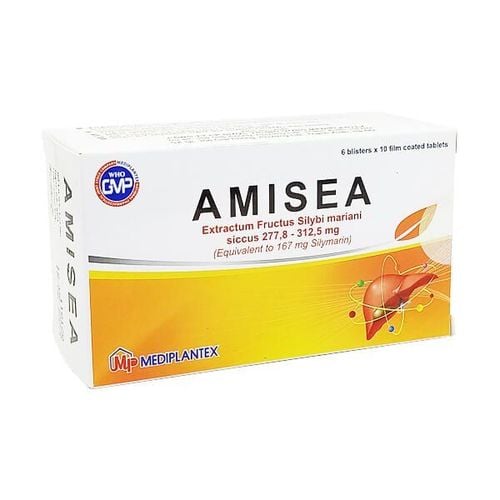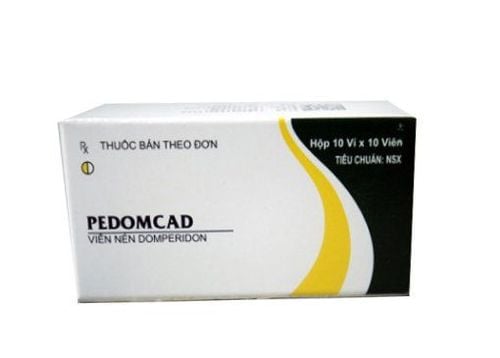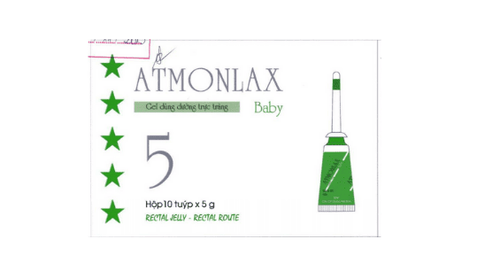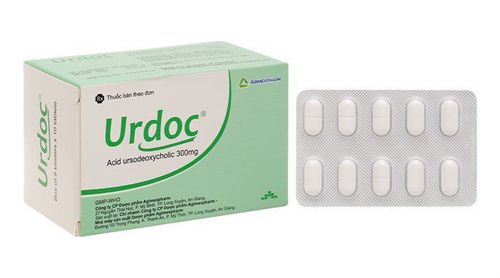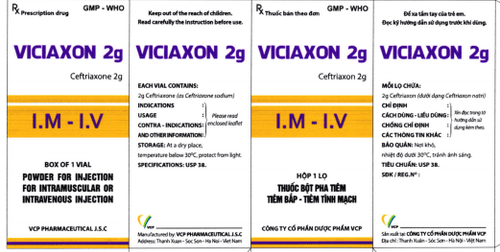This is an automatically translated article.
Ursodeoxycholic acid is a natural bile salt that has many effects in the treatment of cholesterol gallstones or in the treatment of chronic liver diseases. This acid is present in the drug Hypodat. So what is Hypodat and how should it be used?
1. What is Hypodat?
Hypodat medicine has the main ingredient is Ursodeoxycholic Acid 200mg. Ursodeoxycholic acid is a bile salt naturally present in the body in very low concentrations. Unlike other endogenous bile salts, ursodeoxycholic acid is very hydrophilic and has no washing ability. Ursodeoxycholic acid can affect the enterohepatic cycle of endogenous bile acids with the following effects:
Stimulates increased bile secretion; Reduces reabsorption of bile through active intestinal reabsorption; The end result is a decrease in the concentration of endogenous bile acids in the blood. Ursodeoxycholic acid is considered as one of the effective measures to treat gallstones of a cholesterol nature by reducing cholesterol levels in bile. This effect is a combination of several different mechanisms, including decreased cholesterol reabsorption and increased hepatic conversion of cholesterol to bile acids through a pathway that increases hepatic activity of the enzyme cholesterol-7alpha-hydroxylase. Furthermore, ursodeoxycholic acid maintains cholesterol in bile-soluble form.
2. Indications and contraindications of Hypodat
Hypodat is indicated in the following cases:
Improve liver function in patients with chronic hepatitis; Protect and restore liver cells before or after using alcohol; Treatment of dyspepsia, anorexia caused by biliary tract disorders; Support the treatment of cholesterol gallstones, cholecystitis or biliary tract Contraindications to using Hypodat:
Hypersensitivity to the ingredients in the drug; Patients with bile duct obstruction; Pregnant patient.
3. Dosage of the drug Hypodat
The recommended dose is 5-10 mg/kg/day, with a mean of 7.5 mg/kg/day in patients of moderate fitness. For obese patients, the recommended dose of Hypodat is 10mg/kg/day, depending on weight you can take 2-3 Hypodat tablets per day; Drink Hypodat 1 time in the evening or divided into 2 times morning and evening; The duration of treatment for cholesterol gallstones of Hypodat is usually 6 months, but with stones larger than 1 cm, it can be extended up to 1 year. Hypodat dose for chronic hepatobiliary disease:
The recommended dose is 13-15mg/kg/day, should start at 1 Hypodat tablet/day, then increase the dose in a stepwise manner to achieve the optimal therapeutic dose in about 4-8 weeks of treatment. Hypodat dose in case of acquired hepatobiliary disease due to viscous mucus disease: The optimal dose is 20mg/kg/day. Divide into 2 times, drink in the morning and evening after meals.
4. Side effects of the drug Hypodat
Intestinal solubility is very poor, so Ursodeoxycholic Acid does not irritate the intestinal mucosa, so cases of diarrhea when using Hypodat are very rare.
Itching, urticaria increased when the first treatment of severe cholestasis with Hypodat drug. Therefore, the recommended starting dose in this case is 200 mg/day (1 Hypodat tablet).
Patients need to inform the treating doctor about the unwanted effects encountered when using Hypodat medicine.
5. Hypodat Drug Interactions
Hypodat should not be used concurrently with cholestyramine because ursodeoxycholic acid will bind to cholestyramine and be excreted, reducing the effect of the drug. If cholestyramine is needed, the patient should take it 5 hours apart from the time of taking Hypodat.
Patients who are taking Hypodat should not use with drugs containing estrogen hormone because they will increase bile cholesterol.
Avoid using Hypodat with other bile acid-binding drugs, such as antacids, activated charcoal... because it can reduce the effectiveness of treatment.
6. Attention when using Hypodat
For long-term therapy, although Hypodat has no carcinogenic effect, periodic rectal monitoring is recommended.
In the case of treatment of cholesterol gallstones with Hypodat, the patient should be tested for the effectiveness of treatment by means of imaging after 6 months.
Hypodat treatment of chronic hepatobiliary disease should note:
Patients with cirrhosis associated with impaired liver function or cholestasis (blood bilirubin levels above 200 micromol/L), liver function (and if possible) is the concentration of bile acids in the blood plasma) must be monitored periodically; In cases of cholestasis causing rash, the dose of Hypodat should be gradually increased after the initial dose of 200 mg/day. In this case, co-administration of cholestyramine is necessary provided that cholestyramine is administered 5 hours apart from Hypodat. Animal studies have shown Hypodat to be teratogenic. However, there are insufficient data to evaluate the teratogenic or fetotoxic potential of Hypodat when administered to pregnant patients. Therefore, Hypodat should not be used during pregnancy except in very limited cases and must be prescribed by a doctor.
Hypodat does not affect the patient's ability to drive and use machines.
Please dial HOTLINE for more information or register for an appointment HERE. Download MyVinmec app to make appointments faster and to manage your bookings easily.





